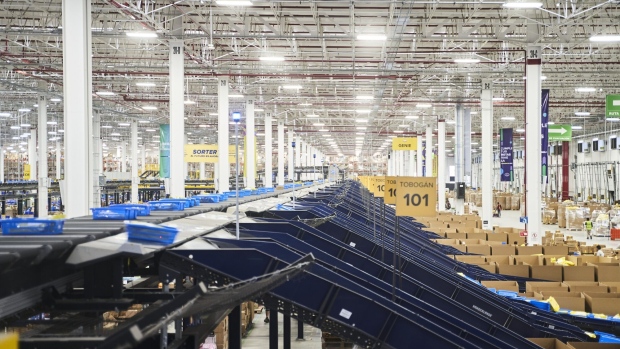Jun 6, 2023
‘Sold Out’ Warehouse Operator in Mexico to Invest $700 Million
, Bloomberg News

(Bloomberg) -- Demand for industrial park space in the Mexican northern cities of Tijuana and Ciudad Juarez is so high that Prologis Property Mexico SA has wait-listed companies looking to set up shop or to expand their current space.
The Mexican real estate investment trust commonly known as Fibra Prologis is planning to invest approximately $700 million this year in warehouses and already built parks, said managing director Hector Ibarzabal in an interview. Prologis Inc., which owns 43% of the Fibra, will invest another $500 million in undeveloped land that carries more risk, he said.
Many US companies are looking to cut supply chains and reduce transportation costs after extensive Covid lockdowns in China made it challenging to operate there through the pandemic. Mexico is set to benefit from the strategy, known as nearshoring, as its nearly 2,000-mile long border with the US offers proximity and cheaper logistics.
“The entire Mexican border is seeing unprecedented levels of activity,” Ibarzabal said. “I’ve been in this business for 30 years and these are historic records of net absorption,” meaning rentals of new space. Prologis’ border markets in Reynosa, Ciudad Juarez and Tijuana are pretty much at capacity, he said.
Read More: Mexico’s Foreign Investment Surges 48% as Nearshoring Booms
Amazon’s Landlord
Fibra Prologis raised $400 million in a May follow-on sale, Ibarzabal said. The company also recently amended a $400 million credit line with nine banks and has the option to increase the facility up to $500 million. Adding cash on hand, Fibra Prologis has about $850 million to spend, of which as much as $700 million will be spent by year end, he estimated. The Fibra’s investments are always focused on buildings and industrial parks that are known as “stabilized assets,” or assets that have already been built and are 95% rented.
The parent company, San Francisco-based Prologis, invests in land and absorbs the risk of developing and renting out the industrial parks that it then sells to the Fibra, Ibarzabal said. This year, he sees Prologis investing about $500 million.
Fibra Prologis has had a total return of about 270% since its 2014 initial public offering, compared with a 54% for the broader Mexican stock exchange. The company is currently worth 69.4 billion pesos ($4 billion).
Industrial real estate in Mexico is showing “strong momentum” as vacancy rates fall under 2%, marking a record, Morgan Stanley analysts wrote in a note last month in which they raised the recommendation on Fibra Prologis to overweight among other companies in the sector.
“We expect momentum to continue,” the analysts, led by Nikolaj Lippman, wrote. “We estimate that Mexico needs [about] 13 million square feet of new inventory over the next five years— an estimate that could easily prove to be conservative given the nearshoring demand.”
Prologis is Amazon.com Inc.’s biggest landlord globally, according to Ibarzabal. “About 3% of the world’s gross domestic product happens in our warehouses,” he said. Other big clients include MercadoLibre Inc. and Walmart Inc.
Challenges
Ibarzabal spoke of competitors who have switched from building office towers or malls to building industrial warehouses to grab a slice of the cake. Still, he said, the nearshoring boom could be three to four times bigger if it weren’t for the lack of electricity in some of these markets.
“Electric infrastructure is our Achilles’ heel,” he said. “There’s no more energy to grow and water is also starting to become a significant problem.”
Mexico’s President Andres Manuel Lopez Obrador in 2021 modified the law to enable state-owned utility Comision Federal de Electricidad, or CFE, to have transmission priority for its aging hydroelectric and thermal plants in the energy grid.
About 65% of the company’s revenues are in US dollars, and the remaining 35% are in Mexican pesos, Ibarzabal said. A large part of the business still comes from US companies seeking labor in Mexico, he said.
“Working inside an industrial warehouse isn’t sexy,” he said. “Young people in the US aren’t interested in this kind of physical work that’s not remote.”
Ibarzabal said that companies now understand that being closer to the US is better, and that’s not going to change any time soon. “We’re always subject to a new geopolitical conflict, a weather event, another pandemic,” he said. “Mexico is where companies can change their global supply chains and make them regional.”
©2023 Bloomberg L.P.






